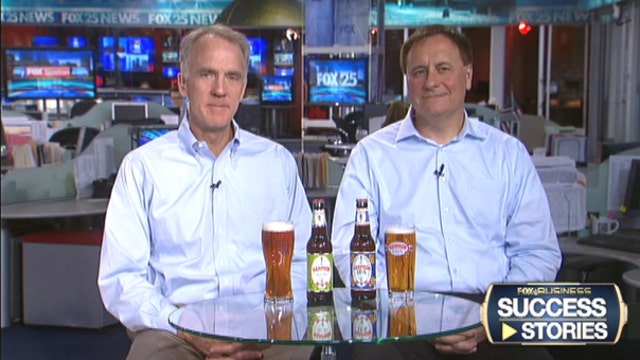Pint-Sized Dreams Tap Frothy Following
From summer barbecues to Saturdays at the ballpark, and every moment in between, there’s no doubt beer has a way of bringing friends together.
It certainly brought together Harpoon Brewery co-founders Rich Doyle and Dan Kenary when they met as classmates at Harvard.
Their friendship quickly turned into a desire to be business partners.
“We had traveled (to Europe) and the (beer) scene in the U.S. at the time was pretty bleak as far as diversity of styles and tastes,” Kenary said. “So we came back with this burning desire: If they can have it over there, this excitement, these great beers…there’s no reason we can’t do it in the U.S.”
First to Brew and Bottle
In 1986, Harpoon Brewery incorporated and was granted Brewing Permit #001 -- the first in Massachusetts in more than 25 years.
Despite the historic achievement, Doyle and Kenary said getting the permit to brew and bottle beer commercially wasn’t the biggest hurdle the young Harpoon brewery faced.
“I think the first hurdle you anticipate is getting retailers to stock the product and getting consumers to want to buy it,” Doyle said.
With that goal in mind, the duo set out to get their brews into as many hands as possible…but their approach was less traditional than most. The media coverage from local outlets including the Boston Globe and Boston Magazine made their job just a little bit easier.
But their biggest break came when the Associated Press released a wire story that many other media outlets picked up. It included a story of the new brewery, a photo, and told the story of two guys from Harvard who were pursuing their life’s dream. .
After that, Doyle said, the rest was about proving Harpoon had something better to offer: their namesake, Harpoon IPA.
“We had a sample of our beers and a clipping from the AP story. We showed it to retailers to prove we weren’t a fly-by-night,” Doyle said. “The other thing is we only sold draught so it limited us to a certain number of accounts, but we were more concentrated that way, as opposed to having a lot of packaged store accounts where we had to compete with other breweries.”
True to Their Roots
While craft breweries have come a long way since Doyle and Kenary started Harpoon, they still have to compete with industry giants like Anheuser-Busch InBev (NYSE:BUD), which makes up 25% of America’s beer market. That means they compete not only for space on the shelf next to the big guys, but also other craft beer makers across the country.
With a loyal following in the Northeast, South and mid-Atlantic regions, the co-founders said they don’t have a desire to saturate the broader U.S. market.
“It’s never been a goal of ours (to reach 50 states),” Doyle said. “It’s something that might happen…we have a tremendous amount of work to do where we already are in talking about Harpoon and getting people to try it, and getting people to stay with us. We have a full plate.”
Added to that, they have no plans to bring the company public. Ever. Doyle said in order for them to even consider an IPO as an option they would have to have a compelling reason to do it, and at this point, with the regulatory burden and the capital required to take Harpoon public, there’s simply no need.
“Certainly after Sarbanes-Oxley where the minimum cost is $2 million a year just to be public, you have to either need liquidity to get some shareholders out or need the liquidity to make an acquisition. There has to be a reason for it other than just, ‘Hey, we’d like to be public for the next 10 years just for the sake of being public,'” Kenary said.
Lasting Impression
For their contribution to the craft brewing movement in America, Doyle and Kenary are more than satisfied with Harpoon’s offerings.
For Doyle, there are two ways to look at it: Harpoon compared to other breweries, and Harpoon’s additions to the beer scene and its customers.
“I think we brought a lot of innovation to New England,” he said. “We were the first to do seasonal beers here in 1988 when we came out with Winter Warmer. In 1993, there were no IPAs in New England. We brought Hefeweizen to the area in 1997 – people couldn’t pronounce it, let alone know what it was. We did an American style, and brought the unfiltered wheat beer to prominence as well.”
Kenary agreed, saying he can’t help but look back at the pair’s initial trips to Europe. That was the defining moment for Harpoon, and when the co-founders really saw a need to bring a new kind of beer culture to America.
“For us, beer is local. It’s a perishable product. We have a lot of work to do locally here in the Northeast to backfill and continue growing. We’ve been in Boston for 27 years and we’d like to grow here for the next 27,” he said.
After all, their business approach comes down to just one simple philosophy.
“If you can’t find it, you better make it, or else you’re not going to be able to drink it,” Doyle said. “Necessity is the mother of invention.”




















